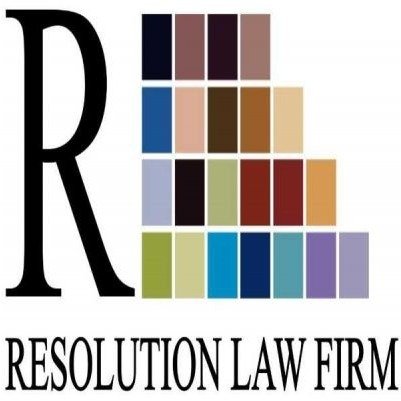Best Arrests & Searches Lawyers in Nigeria
Share your needs with us, get contacted by law firms.
Free. Takes 2 min.
Or refine your search by selecting a city:
List of the best lawyers in Nigeria
Nigeria Arrests & Searches Legal Questions answered by Lawyers
Browse our 1 legal question about Arrests & Searches in Nigeria and read the lawyer answers, or ask your own questions for free.
- Seeking for damages
- I am a salesman, our distributor warehouse was burgled and goods worth 37m were carted away, I and other staff were arrested and detained because our distributor said he suspected us, before the arrest I collected goods worth 350,000 which I am yet to pay. Should I pay the money... Read more →
-
Lawyer answer by Al Fatima Law Associates
Dear, We got your point,You should seek legal action and through proper channel handle your matter,Thanks
Read full answer
About Arrests & Searches Law in Nigeria
In Nigeria, the laws governing arrests and searches are primarily found in the Constitution of the Federal Republic of Nigeria 1999 (as amended), the Administration of Criminal Justice Act 2015, and the Nigerian Police Act. These laws provide guidance on the legal procedures for conducting arrests and searches, ensuring that they are carried out in compliance with human rights standards. Arrests and searches must be conducted with proper legal justification and respect for the rights of individuals. Unlawful arrests or searches can be challenged in court, and victims may seek redress.
Why You May Need a Lawyer
Legal advice is crucial when dealing with arrests and searches in Nigeria due to the complexity of the laws and potential implications. Common situations where legal help might be needed include:
- If you're arrested, ensuring your rights are protected, including the right to remain silent and access to legal representation.
- Challenges related to the legitimacy of an arrest or search, especially if conducted without a warrant or probable cause.
- Seeking compensation or redress in cases of wrongful arrest or violation of rights during searches.
- Navigating the intricacies of bail applications or negotiations with law enforcement.
Local Laws Overview
Key local laws relevant to arrests and searches in Nigeria include:
- The Constitution: Provides fundamental human rights, including protection from arbitrary arrest and guarantees the right to a fair trial.
- Administration of Criminal Justice Act 2015: Sets procedural standards for arrest, detention, bail, and search processes.
- Nigerian Police Act: Details the powers and duties of the police regarding arrests and searches, highlighting the importance of warrants and probable cause.
- Evidence Act: Governs the admissibility of evidence obtained during searches.
Frequently Asked Questions
What are my rights if I'm arrested in Nigeria?
You have the right to be informed of the reason for your arrest, the right to remain silent, and access to legal representation. You must be brought before a court within 48 hours.
Can the police search my home without a warrant?
Generally, a search warrant is required to search a home. However, there are exceptions such as situations involving reasonable suspicion of a crime occurring or being planned.
What should I do if I believe my arrest was unlawful?
Contact a lawyer immediately to discuss your situation. You may have grounds to file a complaint or pursue legal action against the authorities involved.
How can I obtain bail?
Your lawyer can apply for bail on your behalf. The court will consider factors like the severity of the crime, your criminal history, and the risk of fleeing before granting bail.
What is the role of a lawyer during a police investigation?
A lawyer provides legal representation, ensures your rights are protected, advises on making statements, and challenges any procedural irregularities.
Are there penalties for police misconduct during arrest or search?
Yes, law enforcement officers may face disciplinary actions, and aggrieved individuals can seek compensation or redress through legal channels.
How long can I be detained without charge?
You must be charged and brought before a court within 48 hours of arrest, or a reasonable time thereafter if arrested on the weekend or holiday.
Can evidence obtained through illegal searches be used in court?
Evidence obtained unlawfully may be inadmissible under the Evidence Act, depending on how significantly it violates rights and procedural rules.
What is probable cause in search and arrest context?
Probable cause is a reasonable ground to suspect that a person has been involved in or is planning a criminal act, justifying an arrest or search.
How can I report an unlawful search or arrest?
You can file a complaint with the Nigerian Police Force Complaint Response Unit (CRU) or seek judicial redress.
Additional Resources
Here are some resources that might be useful:
- Nigerian Police Force Complaint Response Unit: Handles complaints about police misconduct.
- Legal Aid Council of Nigeria: Provides free legal assistance to those who cannot afford it.
- National Human Rights Commission: Addresses human rights violations.
- Nigeria Bar Association: Offers referrals to licensed lawyers.
Next Steps
If you need legal assistance regarding arrests and searches in Nigeria, consider the following steps:
- Contact a qualified lawyer with experience in criminal law to discuss your situation.
- Gather and document all relevant information about the incident, including dates, locations, and any communication with law enforcement.
- Consider reaching out to legal aid organizations if you require free or low-cost legal services.
- File any necessary complaints with appropriate governmental bodies if there has been a violation of your rights.
Having knowledgeable legal representation is crucial in ensuring your rights are protected throughout the legal process regarding arrests and searches.
Lawzana helps you find the best lawyers and law firms in Nigeria through a curated and pre-screened list of qualified legal professionals. Our platform offers rankings and detailed profiles of attorneys and law firms, allowing you to compare based on practice areas, including Arrests & Searches, experience, and client feedback.
Each profile includes a description of the firm's areas of practice, client reviews, team members and partners, year of establishment, spoken languages, office locations, contact information, social media presence, and any published articles or resources. Most firms on our platform speak English and are experienced in both local and international legal matters.
Get a quote from top-rated law firms in Nigeria — quickly, securely, and without unnecessary hassle.
Disclaimer:
The information provided on this page is for general informational purposes only and does not constitute legal advice. While we strive to ensure the accuracy and relevance of the content, legal information may change over time, and interpretations of the law can vary. You should always consult with a qualified legal professional for advice specific to your situation.
We disclaim all liability for actions taken or not taken based on the content of this page. If you believe any information is incorrect or outdated, please contact us, and we will review and update it where appropriate.
Browse arrests & searches law firms by city in Nigeria
Refine your search by selecting a city.

















